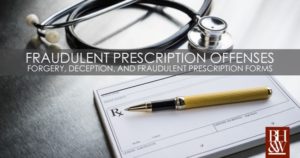Can a Defendant Be Convicted for Using a “Fraudulent Prescription Form” When They Only Altered the Information on an Otherwise Valid Prescription?
Avery v. State, 359 S.W. 3d 230 (2012)
 In 2012, the Texas Court of Criminal Appeals released an opinion concerning whether a defendant may be convicted under Texas Health and Safety Code Section 481.129(a)(5)(B) for using a “fraudulent prescription form” when the facts showed that the defendant altered the dosage information on an otherwise valid prescription that had been written by the defendant’s physician.
In 2012, the Texas Court of Criminal Appeals released an opinion concerning whether a defendant may be convicted under Texas Health and Safety Code Section 481.129(a)(5)(B) for using a “fraudulent prescription form” when the facts showed that the defendant altered the dosage information on an otherwise valid prescription that had been written by the defendant’s physician.
The Facts — The Trial Court Denied Defendant’s Motion and Defendant was Convicted for Using a Fraudulent Prescription Form
In 2009, Defendant received a prescription for forty 2.5-milligram Lortab pills from her doctor after she complained of knee and back pain. Before dropping off the prescription at the pharmacy, Defendant attempted to scribble out the “2.5” and make it look like “7.5.” The pharmacist became suspicious and called the doctor’s office to confirm the prescription. The nurse confirmed the Defendant’s prescription was for 2.5-milligram pills and the pharmacist called the store security, who then contacted police.
During trial in which the defendant had been charged with using a fraudulent prescription form, Defendant moved for a directed verdict of acquittal. Defendant argued that, while there was evidence of forgery, there was no evidence that she used a “fraudulent prescription form” as alleged in the indictment. Defendant further argued that the prescription form was not fraudulent, but only that what the doctor wrote was altered. Therefore, there was no evidence that Defendant committed fraud by using a fraudulent prescription form.
However, the State responded that even by altering an otherwise legitimate prescription form, as Defendant did when attempting to change the dosage, Defendant had created a fraudulent prescription form. The trial court denied Defendant’s motion and the jury found Defendant guilty. Defendant was sentenced of 25 years’ confinement and a $1,500 fine.
The Court of Appeals Vacated the Trial Court’s Judgment and Entered a Verdict of Acquittal, Holding Defendant’s Actions More Closely Resembled Actions in a Different Subsection of Statute Instead of that Listed in the Indictment
Section 481.129 of the Texas Health and Safety Code governs the offense of fraud under the Texas Controlled Substances Act. According to Section 481.129(a)(5)(A), a person commits an offense if they possesses, obtains, or attempts to possess a controlled substance by misrepresentation, fraud, forgery, deception, or subterfuge.
Section 481.129(a)(5)(B) differs slightly in that a person commits the offense if they possess or attempt to possess a controlled substance through the use of a fraudulent prescription form.
Section 481.075 of the Texas Health and Safety Code governs the “Official Prescription Program,” which prescribers must follow in order to prescribe Schedule II Controlled Substances. This section describes the elements of an “official prescription form” as the controlled substance prescribed as well as the quantity of that controlled substance. The State argued that since the prescriber’s written words are part of the “official prescription form,” the Defendant turned the entire document into a “fraudulent prescription form” when she altered the written words.
The Court of Appeals, however, accepted neither party’s argument in full and believed its job was to determine whether Defendant’s actions were “more” like the “misrepresentation, fraud, [or] forgery” or like the “use of a fraudulent prescription form.” The Court of Appeals determined that the action may fall under either description, but cannot fall under both. Thus, the Court of Appeals ruled that Defendant’s actions—altering the writing—more closely resembled “forgery” than the “use of a fraudulent prescription form.”
Accordingly, the Court of Appeals vacated the trial court’s judgment and entered a verdict of acquittal.
The Court of Criminal Appeals Affirmed the COA, Holding that Defendant’s Alteration of Information on the Legitimate Prescription Violated a Different Statute than that for which Indicted
The Court of Criminal Appeals first addressed factual matters in the Court of Appeals’s opinion. Beginning with discussing the original indictment, it did not specify which Schedule of controlled substance Lortab is on. The Court of Appeals identified it is a Schedule II controlled substance, but also cited to definitions that describe Lortab as a combination drug that may be Schedule III. The pharmacist’s testimony identified Defendant’s Lortab as a Schedule III controlled substance mixture.
Secondly, as a result of a different schedule drug, Section 481.075 would not be applicable as it only applies to Schedule II controlled substances and does not mention Schedule III substances. Further, there was nothing in the record that led the Court of Criminal Appeals to believe that Defendant used an “official prescription form.”
The Court of Criminal Appeals analyzed how the Court of Appeals discussed the history and intent of the statutes, and determined that, based on statutory inferences and common language, “prescription form” refers to a pre-printed form that is used to write information on it. Further, the Legislature intended to create a legal distinction between completed prescriptions and the prescription forms.
After analyzing the statute applied in the Court of Appeals, the Court of Criminal Appeals determined that Subsection (B) of Section 481.129(a)(5) only governs the use of a fraudulent prescription form. Further, the Court of Criminal Appeals ruled that the writing on the form is not an element of that offense.
In the case at hand, the State originally charged Defendant with attempting to obtain a controlled substance “through use of a fraudulent prescription form.” The evidence presented by the State adduced that Defendant fraudulently altered the information written on the legitimate prescription form. Although the evidence would have supported a conviction had Defendant been charged under another statute, the evidence does not support a conviction for the offense Defefndant was charged with.
Although the Court of Criminal Appeals disagrees with the reasoning of the Court of Appeals, it agrees in its judgment and affirms the Court of Appeals’s judgment of acquittal.










